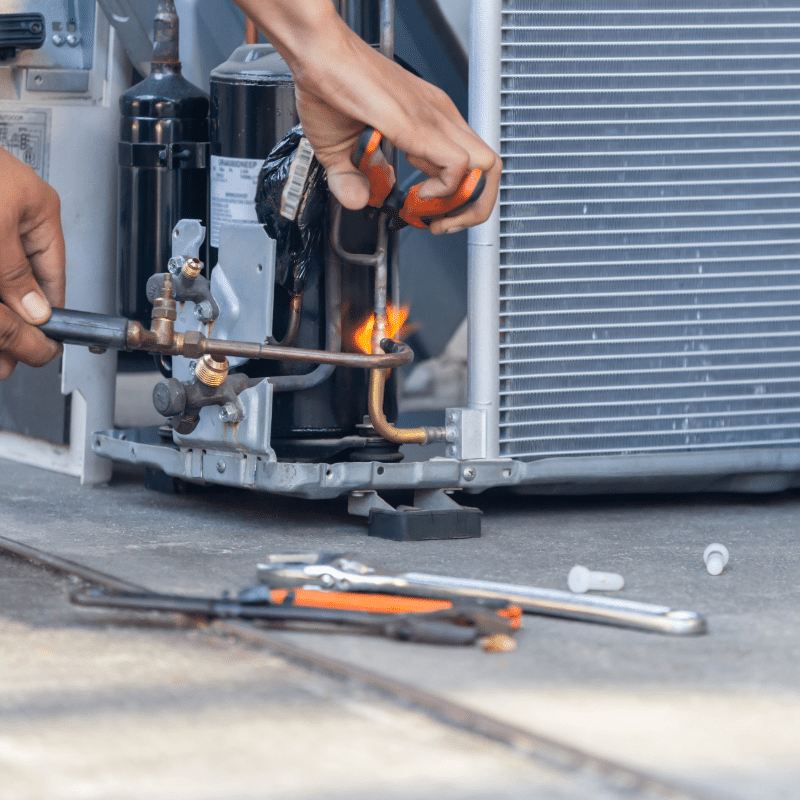As San Fernando Valley temperatures soar, your air conditioner plays the crucial role of battling the relentless heat to keep your family comfortable. But even heroes need backup. How do you know whether your AC needs maintenance, repair, or replacement?
Understanding the difference between repairing or replacing your AC ensures it stays reliable and efficient all summer long. MightyServ, the trusted HVAC experts in LA, will help you pay attention to the intricate signs and indicators that signal whether your AC unit needs repair or replacement, empowering you to make informed decisions and maintain cool comfort throughout the blistering summer season.
Signs Your AC Needs Repair
Weak Airflow
Reduced airflow from your vents is often the first indicator of a potential issue with your AC system. This can be caused by various factors, including obstructions in the ductwork, dirty or clogged air filters, or malfunctioning components such as the blower motor or compressor. A thorough inspection by a qualified HVAC technician is essential to identify the root cause and address it effectively. By rectifying these airflow impediments, you can restore optimal cooling efficiency and ensure consistent comfort throughout your home.
Strange Noises
Unusual sounds emanating from your AC unit, such as grinding, squealing, or banging, are ominous signs that should not be ignored. These noises often indicate underlying mechanical issues, such as loose or worn-out components, damaged belts, or failing motors. Continuing to operate the system in the presence of such sounds can exacerbate the problem, leading to more extensive damage and costly repairs down the line. Prompt intervention by a professional technician is crucial to diagnose and address these auditory anomalies, thereby preserving the integrity and longevity of your AC system.
Frequent Cycling
Short cycling, characterized by the frequent and rapid cycling of your AC unit on and off, is a common issue that can compromise both energy efficiency and system performance. This phenomenon may be attributed to several factors, including thermostat malfunctions, refrigerant leaks, improper sizing, or inadequate airflow due to dirty coils or filters. Left unchecked, short cycling can place undue stress on the system, accelerate wear and tear, and increase energy consumption. A comprehensive assessment by a qualified technician is essential to identify and rectify the underlying causes of short cycling, thereby optimizing system operation and prolonging its lifespan.
Warm Air
One of the most obvious indicators that your AC system requires attention is the emergence of warm air instead of cool air from the vents. This can be caused by a variety of issues, including refrigerant leaks, compressor malfunctions, or thermostat inaccuracies. Regardless of the specific cause, warm air circulation compromises indoor comfort and indicates a malfunction within the system that requires prompt attention. Professional diagnosis and repair are essential to address the underlying issue and restore the system’s cooling capabilities, ensuring consistent comfort throughout your home.
When to Consider Replacement
Age of the System
The age of your AC system is a critical factor to consider when evaluating whether to repair or replace it. Most air conditioning units have a lifespan of approximately 10-15 years, after which they may experience a decline in efficiency and an increase in the frequency of breakdowns. If your AC unit is approaching or exceeding this age threshold and requires frequent repairs, it may be more cost-effective in the long run to invest in a new, energy-efficient AC system. While the upfront cost of replacement may seem daunting, modern AC units offer significant advancements in energy efficiency and performance, resulting in lower operating costs and enhanced comfort.
High Energy Bills
Escalating energy bills despite regular maintenance and usage patterns may indicate that your AC system is operating inefficiently. Older or poorly maintained systems often consume more energy to achieve the desired level of cooling, resulting in higher utility costs. If you notice a steady increase in your energy bills over time, it may be indicative of an inefficient AC system that is struggling to keep up with your cooling demands. Investing in a new, energy-efficient AC unit can not only reduce your energy bills but also provide superior comfort and reliability, making it a worthwhile long-term investment.
Frequent Repairs
Persistent breakdowns and the need for frequent AC repairs are clear signs that your system is nearing the end of its lifespan and may require replacement. While minor repairs are a normal part of HVAC maintenance, the frequency and cost of repairs can quickly add up and become financially burdensome. If you find yourself calling a technician for AC repairs more than once a year or if the cost of repairs exceeds the value of the system, it may be more economical to invest in a new unit. Newer AC systems offer improved reliability, energy efficiency, and warranty coverage, providing peace of mind and long-term savings.
Poor Indoor Air Quality
An aging or malfunctioning AC system can compromise indoor air quality, leading to a host of health issues such as allergies, respiratory problems, and discomfort. If you notice excessive dust accumulation, mold growth, or musty odors in your home, it may be indicative of poor indoor air quality resulting from an inefficient or malfunctioning AC system. Upgrading to a new, high-efficiency AC unit with advanced filtration capabilities can significantly improve indoor air quality by removing airborne contaminants and allergens, creating a healthier and more comfortable living environment for you and your family.
Understanding when to repair or replace your AC system is essential for maintaining indoor comfort and avoiding breakdowns during the hot summer months. By paying attention to the subtle signs, it ensures optimal performance, energy efficiency, and comfort throughout its lifespan. Whether you opt for professional repairs to address specific issues or invest in a new unit, MightyServ is here to help. Just give us a call at (818) 348-4768!








